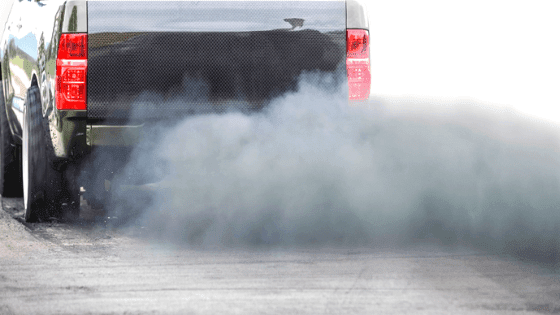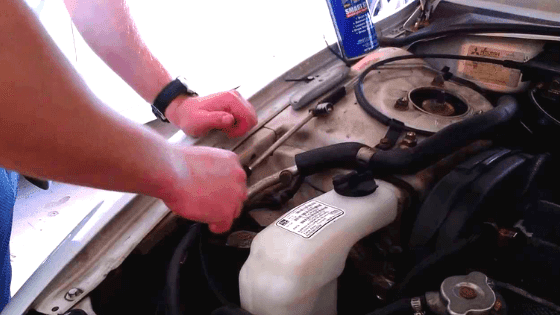Can I drive with white smoke from the exhaust? in most cases, especially in the winter, some white smoke from your exhaust is perfectly normal and should not cause you concern. But other causes can be alarming. Read on to find out why this happens and when you should be concerned about fixing the problem.
 |
| white smoke from exhaust |
Top 7 Reasons Why White Smoke Comes From Your Exhaust Pipe
If you're in the unfortunate situation where white smoke continues to come out of your exhaust after letting your car warm up for more than a few minutes, you may have internal problems.
It's important that you fix the problem quickly so that your engine and exhaust system are not damaged in any way.
7 of the most common causes of a car blowing white smoke.
1) Condensation burns
 |
| Condensation burns |
If you notice white smoke coming from your muffler, don't automatically assume the worst. You may not have to worry because it could simply be condensation buildup that is causing this.
In these situations, you will usually see this white smoke coming out on cooler days. The smoke should only come out in small amounts after your engine is started. Then after about 30 seconds to a minute, the white smoke should dissipate. If this is the case, you have nothing to worry about.
2) Cracked cylinder head
 |
| Cracked cylinder head |
Any time your cylinder head is cracked or damaged, coolant will start to leak out. It doesn't have to be a big crack either. All it takes is a little bit of coolant to leak out and mix with the engine oil.
Once this happens, the oil will be contaminated. The first sign of contaminated oil is white exhaust smoke coming out of the tailpipe. As this continues, the white smoke will begin to have a sweet smell that will not go away.
Read also: 5 Causes of a Car Ignition Key That Won’t Turn (or is Stuck)
3) Damaged coolant reservoir
 |
| Damaged coolant reservoir |
Another area that can leak coolant is the coolant reservoir tank. This is usually a less common leak, but it can happen if the reservoir were to become damaged or cracked.
Sometimes this happens if a mechanic fixes another problem in the vehicle and accidentally damages the reservoir. In any case, you will need to replace the tank's reservoir whenever it is damaged.
4) Oil leakage
 |
| car Oil leakage |
If oil ever leaks from your piston rings or valve seals, it will flow into the internal combustion chamber with the fuel. Once the fuel and oil have mixed, it will come out of the exhaust pipe. You will probably see a bluish colored smoke from your exhaust, but it may look like white smoke to some people.
You would obviously want to fix this leak quickly because if the engine components are not properly lubricated by the oil, they will start to wear out and get damaged pretty quickly. This will cause a whole other herd of costly problems that you won't want to have.
5) Bad Fuel Injector
 |
| car Bad Fuel Injector |
The fuel injector is responsible for injecting fuel into the internal combustion chamber at the right time. If you were to have a bad fuel injector, it would cause white smoke to form because the right amount of fuel was not entering the chamber at the right time.
6) Engine Control Unit Error
 |
| car ngine Control Unit Error |
If you have a faulty engine control unit or one that is simply glitchy, it can disrupt the timing of the fuel injector. This doesn't mean that the fuel injector is bad or anything. It just means that you need to repair or reprogram the engine control unit so that it can correct the fuel pump injector timing.
Often, you can simply disconnect your car's battery for a few minutes to reset the computer and the problem will resolve itself. But if not, you'll need to visit your dealership to do this, as it requires expert mechanics who know your vehicle's engine to reprogram the engine control unit.
7) Cracked engine block
 |
| car Cracked engine block |
The worst case scenario is that your entire engine block is cracked. These are the types of problems that will be the most expensive to fix. You probably won't know which of these problems is causing the white smoke until you have your vehicle examined by a mechanic and diagnosed.
White smoke from exhaust diesel
In addition to recognizing and understanding testers and gauges, white diesel smoke is what can alert you to potential problems in an engine. In many cases, the emission of white smoke when the vehicle is started is usual. However, if the emanation from the vehicle's exhaust pipe continues even after an ideal temperature has been reached, it indicates incomplete combustion of the fuel.
The reasons behind unburned or partially burned and intact raw diesel can vary considerably. However, to diagnose the source of the problem, it is important to first understand the causes that may be responsible for generating the problem.
1. Worn components (such as valve seats, head gasket, cylinder head or liner)
Torn or worn components in an engine are really a thoughtful issue. Because damaged engine parts cause white smoke in the exhaust. For example, if the valve seats are not properly adjusted or are badly worn, this will partially activate the decompression lever. As a result, the piston will not be able to move freely in the cylinder due to the high compression inside the chamber.
2. Lack of adequate compression in the cylinder
One of the main causes of low compression in the cylinder is a leak or broken valves. But in the line, there are also other culprits such as broken cylinder rings.
3. Inaccurate fuel injection timing
If the gear or crankshaft is damaged, fuel will be delivered late to the combustion chamber. As a result, the fuel will burn partially, emitting the white smoke of diesel exhaust.
4. Damaged fuel injectors
When the fuel injectors do not spray the proper amount of fuel into the combustion vessel, it means that the injectors need immediate maintenance. Thus, replacement or repair of the damaged fuel injector can be performed.
In order to detect this problem, the engine would be a little louder than normal days.
5. Faulty fuel pump
The damaged fuel pump will lack adequate power, which will cause low pressure inside the pump. This happens because of the lack of sufficient pressure that allows things like air to enter the fuel line.
So remember, whatever the cause of the white exhaust smoke, it needs to be checked out before the situation gets worse. Because when a person, as a responsible driver, treats his or her engine well, it serves him or her well for a longer period of time.
This is why you have white SMOKE coming from your EXHAUST
